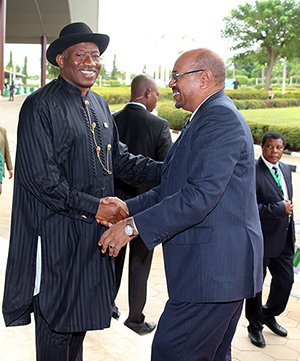
Nigerian human rights activists came together at a press conference on July 15 to challenge their government’s decision to host International Criminal Court, or ICC, indictee, and Sudanese President Omar al-Bashir at the African Union health summit on AIDS/HIV, tuberculosis, and malaria. The collection of local non-profit and civil society leaders rapidly organized and submitted a petition to and filed a suit against the High Federal Court in Nigeria’s capital Abuja calling on the government to uphold its obligations as a member to the ICC treaty. Condemnation of Nigeria’s government by western institutions such as Human Rights Watch and the British Government received harsh reaction from Sudan’s Foreign Ministry, labeling the British government as "hypocritical" because of its involvement in the Iraq war.
Bashir Watch and United to End Genocide led a social media campaign on Monday to shame Nigeria for welcoming Bashir into the country.

Sudanese Presidential spokesman Reuben Abati defended the trip stating, "The Sudanese president came for an AU event and the AU has taken a position on the ICC arrest order, so Nigeria has not taken action different from the AU stand.” In 2009, the A.U. passed a resolution that encouraged all members to disregard ICC arrest warrants for African leaders and officials when they visit countries who have agreed to the Rome Statute.
Rights groups and activists took to social media again on Tuesday, July 16 after reports that Bashir left Nigeria late Monday night due to fear of being apprehended by authorities. Sudan’s ambassador to the African Union has stated it was not due to calls for arrests. The A.U. health summit was not due to end until Tuesday. Nigeria’s handling of Bashir seems contradictory to many considering that it handed ex-Liberian President Charles Taylor to the ICC to stand trial on war crimes charges, following international pressure in 2006.
Photo: Bashir greets Nigerian President Goodluck Jonathan in Abuja on July 15 (AP).

